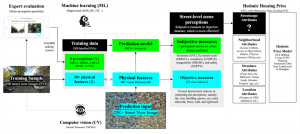
Regional Science Ph.D student Waishan Qiu received the Portman Family Graduate Award (2021) and the Kermit C. & Janice I. Parsons Scholarship (2019) to support his research. Two of Waishan’s papers titled (1) The interplay between dockless bikeshare and bus for small-size cities in the US: A case study of Ithaca and (2) Subjective measures of street environment, which are more effective in explaining housing prices were recently accepted for publication.

Waishan’s Lime bike-share & bus ridership paper was supported by the Portman Family Graduate Award (2021), the AAP Alan Black Transportation-related Fund (2020), and the Cornell Serve in Place Fund (2020). His paper aimed to fill several research gaps that work to integrate micro mobility and public transit. His team measured the interplay between Lime and bus service in Ithaca by spatially and temporally joining about 3.42 million records of bus stop data and 102 thousand Lime bikeshare trip data from 2019. Based on the unique first- and last-mile trips that were identified in the study, his team hopes this study can help to guide policy implementation and recommendations to better integrate bikeshare and public transit systems.
Waishan’s second paper, which was supported by the Kermit C. & Janice I. Parsons Scholarship (2019), used AI to quantify the impact of perceived street environment on housing prices. He argues that objective indicators, such as tree counts and distance to parks, cannot completely describe people’s sense of place. His research found that subjectively measured design qualities and objective indicators outperformed housing structural attributes in explaining housing price.
Waishan’s advice for younger students is to, “Keep reading and writing every day and pay attention to various funding opportunities across the departments and university. Continuing to write is the most important, and it could be as simple as writing down the name and highlight of a paper you read today (which might contribute to your literature review some day). Don’t be frightened by writing proposals, they are good opportunities to clean up your thoughts and test your ideas.”
After finishing his Ph.D., Waishan hopes to work in the industry to explore how urban analytics and digital transformations can assist public sectors and smart cities in China. His long-term goal is to find a job teaching in the fields of urban analytics, built environments, or regional science.